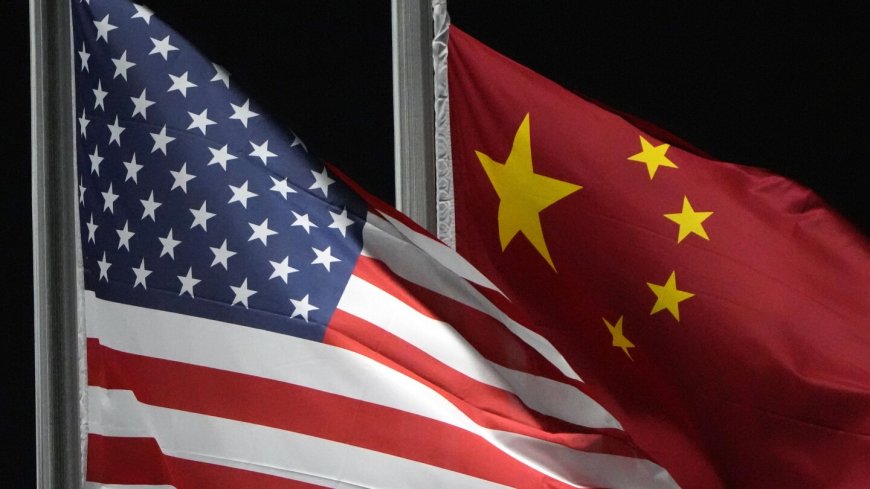China sanctions 7 companies over US military assistance to Taiwan
BEIJING (AP) — The Chinese government placed sanctions on seven companies on Friday in response to recent U.S. announcements of military sales and aid to Taiwan, the self-governing island that China claims as part of its territory.The sanctions also come in response to the recent approval of the U.S. government's annual defense spending bill, which a Chinese Foreign Ministry statement said “includes multiple negative sections on China.”China objects to American military assistance for Taiwan and often imposes sanctions on related companies after a sale or aid package is announced. The sanctions generally have a limited impact, because American defense companies don't sell arms or other military goods to China. The U.S. is the main supplier of weapons to Taiwan for its defense.The seven companies being sanctioned are Insitu Inc., Hudson Technologies Co., Saronic Technologies, Inc., Raytheon Canada, Raytheon Australia, Aerkomm Inc. and Oceaneering International Inc., the Foreign Ministry statement said. It said that “relevant senior executives” of the companies are also sanctioned, without naming any.Hub peek embed (Taiwan) - Compressed layout (automatic embed) Any assets they have in China will be frozen, and organizations and individuals in China are prohibited from engaging in any activity with them, it said.U.S. President Joe Biden last week authorized up to $571 million in Defense Department material and services and military education and training for Taiwan. Separately, the Defense Department announced that $295 million in military sales had been approved.The U.S. defense bill boosts military spending to $895 billion and directs resources toward a more confrontational approach to China. It establishes a fund that could be used to send military resources to Taiwan in much the same way that the U.S. has backed Ukraine. It also expands a ban on U.S. military purchases of Chinese products ranging from drone technology to garlic for military commissaries.Zhang Xiaogang, a Chinese Defense Ministry spokesperson, said earlier this week that the U.S. is hyping up the “so-called” threat from China to justify increased military spending.“U.S. military spending has topped the world and keeps increasing every year,” he said at a press conference. "This fully exposes the belligerent nature of the U.S. and its obsession with hegemony and expansion.”The Foreign Ministry statement said the U.S. moves violate agreements between the two countries on Taiwan, interfere in China’s domestic affairs and undermine the nation's sovereignty and territorial integrity.Taiwan's government said earlier this month that China had sent dozens of ships into nearby seas to practice a blockade of the island, a move that Taiwan said undermined peace and stability and disrupted international shipping and trade. China has not confirmed or commented on the reported military activity.

BEIJING (AP) — The Chinese government placed sanctions on seven companies on Friday in response to recent U.S. announcements of military sales and aid to Taiwan, the self-governing island that China claims as part of its territory.
The sanctions also come in response to the recent approval of the U.S. government's annual defense spending bill, which a Chinese Foreign Ministry statement said “includes multiple negative sections on China.”
China objects to American military assistance for Taiwan and often imposes sanctions on related companies after a sale or aid package is announced. The sanctions generally have a limited impact, because American defense companies don't sell arms or other military goods to China. The U.S. is the main supplier of weapons to Taiwan for its defense.
The seven companies being sanctioned are Insitu Inc., Hudson Technologies Co., Saronic Technologies, Inc., Raytheon Canada, Raytheon Australia, Aerkomm Inc. and Oceaneering International Inc., the Foreign Ministry statement said. It said that “relevant senior executives” of the companies are also sanctioned, without naming any.
Any assets they have in China will be frozen, and organizations and individuals in China are prohibited from engaging in any activity with them, it said.
U.S. President Joe Biden last week authorized up to $571 million in Defense Department material and services and military education and training for Taiwan. Separately, the Defense Department announced that $295 million in military sales had been approved.
The U.S. defense bill boosts military spending to $895 billion and directs resources toward a more confrontational approach to China. It establishes a fund that could be used to send military resources to Taiwan in much the same way that the U.S. has backed Ukraine. It also expands a ban on U.S. military purchases of Chinese products ranging from drone technology to garlic for military commissaries.
Zhang Xiaogang, a Chinese Defense Ministry spokesperson, said earlier this week that the U.S. is hyping up the “so-called” threat from China to justify increased military spending.
“U.S. military spending has topped the world and keeps increasing every year,” he said at a press conference. "This fully exposes the belligerent nature of the U.S. and its obsession with hegemony and expansion.”
The Foreign Ministry statement said the U.S. moves violate agreements between the two countries on Taiwan, interfere in China’s domestic affairs and undermine the nation's sovereignty and territorial integrity.
Taiwan's government said earlier this month that China had sent dozens of ships into nearby seas to practice a blockade of the island, a move that Taiwan said undermined peace and stability and disrupted international shipping and trade. China has not confirmed or commented on the reported military activity.


























































